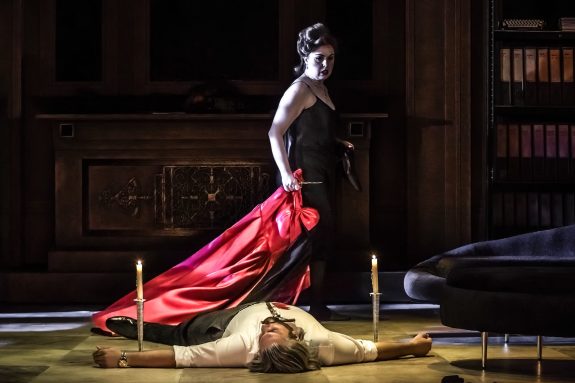 United Kingdom The Grange Festival 2024 – Puccini, Tosca: Soloists, The Grange Festival Chorus (chorus master: William Vann), The Grange Festival Children’s Chorus (chorus master: David Hall), Bournemouth Symphony Orchestra / Francesco Cilluffo (conductor). The Grange, Hampshire 21.6.2024. (CK)
United Kingdom The Grange Festival 2024 – Puccini, Tosca: Soloists, The Grange Festival Chorus (chorus master: William Vann), The Grange Festival Children’s Chorus (chorus master: David Hall), Bournemouth Symphony Orchestra / Francesco Cilluffo (conductor). The Grange, Hampshire 21.6.2024. (CK)

There is an essay in The Grange Festival programme book for Christopher Luscombe’s fine new production of Tosca by its conductor, Francesco Cilluffo, entitled ‘Tosca, the opera Mahler never wrote’. It is an interesting conjunction: almost exact contemporaries, both composers were men of the theatre – Puccini wrote almost nothing except operas, Mahler spent his entire (and intense) working life preparing and conducting them. Both bestrode the fin de siècle divide between Romanticism and Modernism: for Cilluffo, ‘Tosca is the first opera to deal with modern neurosis, bridging Italian opera…from late nineteenth-century verismo to twentieth-century expressionism’.
There, I think, the resemblance ends: but Cilluffo is entitled to see a kinship between Mahler’s ironic/horrific vision in his later symphonies – of a world coming adrift from its traditional verities, of the tramp of armies towards the industrial-scale slaughter of mechanised warfare – and the claustrophobic terrors of Puccini’s Tosca-universe: a place where virtue, courage and loyalty are at the mercy of violence and corruption, where (despite the oppressive Catholic trappings) there is no God to intervene, and where love itself can be twisted to torment and betrayal.
Perhaps these thoughts are in themselves an indication of how powerfully the performance struck home. In The Grange’s relatively intimate space we experienced the moments of high drama viscerally, the playing of the Bournemouth Symphony Orchestra coming at us with stinging force.
The Uruguayan tenor Andres Presno took a little while to hit his stride as Cavaradossi: his tone not especially beautiful, his delivery of Recondita armonia rather monochrome. Perhaps it was deliberate that the appearance of Tosca brought him to life: his adoration of Tosca’s eyes was ardent indeed, and their two voices combined thrillingly. Francesca Tiburzi’s Tosca was the real deal: a smartly dressed VIP, her voice rich and full, imperious rather than sensuous. Dan D’Souza was true and touching as Angelotti; the Children’s Chorus were a lively bunch of choirboys, leapfrogging and playing with yoyos under the indulgently blind eye of Darren Jeffrey’s imposing Sacristan. The close of Act I was properly spectacular, a sensory assault of colour and sound (and incense), the blaze of the Te Deum enclosing the sinister brooding of Scarpia like a worm in the bud.
Act II generated even greater intensity. It was clear from the appearance of Scarpia and his thugs what kind of organisation Tosca is up against – one with too many chilling parallels (when Cavaradossi is executed at the end of the opera there is no firing squad, just a pistol to the head). Andrew Manea’s Scarpia is a force to be reckoned with; physically not so much an embodiment of twisted evil as a figure of almost Hvorostovsky-like glamour, with more than a hint of Don Giovanni about him as he lounged on his sofa, enjoying Cavaradossi’s suffering and Tosca’s distress.
Tiburzi completed her own portrait of Tosca with a movingly beautiful Vissi d’arte, rapturously received. There was a powerful chemistry between her and Manea, intensified by the removal of Cavaradossi through a trapdoor to be tortured in a cellar. Bloody but unbowed, Presno was able to greet the news of Napoleon’s victory at Marengo with a magnificently ringing and sustained Vittoria! In her bargain to save her lover’s life Tosca submits to Scarpia removing her dress: when she has killed him, she keeps the knife (sensible girl), and uses it at the end of the third act to do some more damage before falling elegantly backwards from the battlements.

I am tempted to say that my favourite moment of Act III was the lovely passage for horns that opens it: but that would be to do an injustice to Presno’s E lucevan le stelle, which was (as it should be) the raw, existential crisis of the whole opera: the stark juxtaposition of lost Eros and imminent Thanatos. He sang it magnificently; a word, too, for the suitably fragile song of the Shepherd boy (Sion Llywelyn-Davies).
The production values of the performance were high, the mise-en-scène handsome, naturalistic and detailed: the church interior for the first act was light, airy and beautiful, Scarpia’s lair in the Palazzo Farnese dark-panelled and windowless, the split-level roof of the Castel Sant’Angelo atmospheric and admirably suited to the drama of the dawn. Wonderful music, magnificent theatre, and in Francesca Tiburzi, a Tosca for the ages. And yet… it is a long time since Joseph Kerman dismissed the opera in a notorious alliterative phrase: but we may feel slightly uncomfortable, even complicit, in yielding to the Puccini brand – sentiment spiced with sadism – even as we acknowledge it to be a masterpiece. I can only speak for myself in saying that that is part and parcel of Puccini, and testimony to the unflinching excellence of the performance. In any case, any such qualms soon evaporate in the midsummer magic of the total experience of opera at The Grange.
A postscript. From my seat I was able to appreciate another way in which Puccini resembles Mahler: he writes wonderfully well for tuba.
Chris Kettle
Production:
Director – Christopher Luscombe
Designer – Simon Higlett
Lighting designer – Mark Jonathan
Fight director – Maisie Carter
Cast:
Floria Tosca – Francesca Tiburzi
Mario Cavaradossi – Andres Presno
Baron Scarpia – Andrew Manea
Cesare Angelotti – Dan D’Souza
Sacristan – Darren Jeffery
Spoletta – Vladimir-Mihai Sima
Sciarrone – Stuart Orme
Gaoler – Meilir Jones
Shepherd boy – Sion Llywelyn-Davies
Judge – David Menezes
Roberti – Warren Gillespie
Cardinal – Richard Stead
